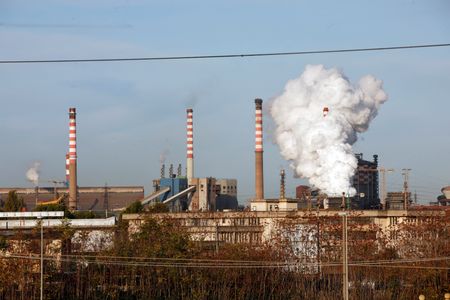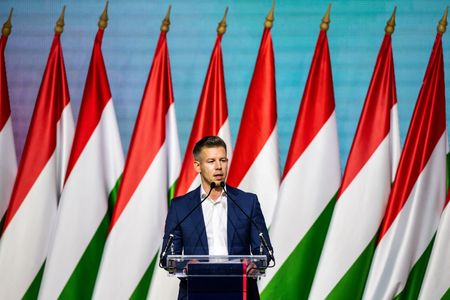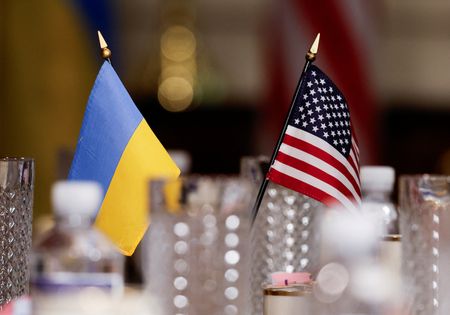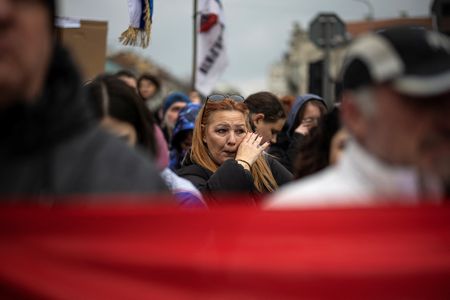By Nidal al-Mughrabi, Maayan Lubell and Ali Sawafta
CAIRO/JERUSALEM/RAMALLAH (Reuters) – Hamas released Israeli hostages Iair Horn, Sagui Dekel Chen and Sasha (Alexander) Troufanov in Gaza on Saturday and Israel freed some 369 Palestinian prisoners and detainees in exchange, after mediators helped avert a collapse of the fragile ceasefire.
The three Israelis were led onto a stage with Palestinian Hamas militants armed with automatic rifles standing on each side of them at the site in Khan Younis, live footage showed, before they were taken back into Israel by Israeli forces.
Shortly afterwards, buses carrying freed Palestinian prisoners and detainees departed Israel’s Ofer jail in the Israeli-occupied West Bank. The first bus arrived in Ramallah to a cheering crowd, some waving Palestinian flags.
“We didn’t expect to be freed, but God is great, God set us free,” said Musa Nawarwa, 70, from the West Bank town of Bethlehem, who was serving two life terms for killings of Israeli soldiers in the West Bank.
Buses carrying some of the hundreds of Palestinian freed prisoners and detainees, some flashing victory signs as they hung from the windows, arrived later at the European Hospital in Khan Younis in the southern Gaza Strip.
Some of the Palestinians were serving long prison terms for involvement in suicide bombings and other attacks that killed dozens of Israelis during the second Palestinian uprising in 2000. Others were jailed for killing Israeli soldiers in the occupied West Bank.
Some, like Hassan Ewis, will be allowed to return to their homes. Others, such as his brother, are expected to be deported to Egypt.
Ewis’ charge sheet in the Israeli Justice Ministry records include the planting of explosives and attempted murder and intentional homicide. He said prison conditions were difficult and Palestinians were deprived of sufficient food.
Some of the Israeli hostages who have returned since January 19 have reported being deprived of food, held in tunnels for months and not seeing daylight, and being subjected to physical and psychological abuse.
Some freed Palestinians are returning to an enclave they have not seen for years, before it was blasted into rubble by Israeli airstrikes and shelling in 15 months of war. But most were rounded up after the Hamas-led October 7, 2023 attack on Israel.
‘NOW WE CAN BREATHE A LITTLE’
The ceasefire’s second phase is meant to usher in negotiations to return the remaining living hostages among the 251 seized that day, and complete an Israeli military withdrawal before a final end to the war and the reconstruction of Gaza.
Argentina-born Iair Horn, 46, was taken captive together with his younger brother Eitan. Horn appeared to have lost considerable weight in captivity.
“Now, we can breathe a little. Our Iair is home after surviving hell in Gaza. Now, we need to bring Eitan back so our family can truly breathe,” Horn’s family said in a statement.
The swap of the three Israelis for the 369 Palestinians allayed growing alarm that the ceasefire agreement could unravel before the end of the 42-day first stage of the truce pact in effect since January 19.
In what has become known as Hostage Square in Tel Aviv, people broke into cheers and tears after hearing the Red Cross was on its way to deliver the three to Israeli military forces.
Dekel Chen, a U.S.-Israeli, Troufanov, a Russian Israeli, and Horn along with his brother Eitan were seized in Kibbutz Nir Oz, one of the communities near Gaza’s border that were overrun by Hamas gunmen on October 7, 2023.
On the handover stage in Khan Younis, the hostages were made to give short statements in Hebrew and militants presented Horn with an hourglass and photo of another Israeli hostage still in Gaza and his mother, reading “time is running out (for the hostages still in Gaza)”.
Troufanov was abducted with his mother, grandmother and girlfriend – all of whom were released during a brief November 2023 pause in hostilities. His father was killed in the attack on Nir Oz, one of the worst-hit communities, where one in four people either died or were taken hostage.
On October 7, Dekel Chen, 36, left his pregnant wife and two little daughters in the family safe room to go out and fight gunmen rampaging through the kibbutz.
He embraced his tearful wife Avital tightly and said “perfect” with a big smile when she told him the name of their baby daughter, who he has not yet seen, was Shahar Mazal, Hebrew for “dawn” and “luck”, in a video released by the military.
Nineteen Israeli and five Thai hostages have been released so far, with 73 still in captivity, around half of whom have been declared dead in absentia by Israeli authorities.
Prospects for the ceasefire surviving have been shaken by U.S. President Donald Trump’s call for Palestinians to be resettled permanently out of Gaza, and for the tiny enclave to be turned over to the U.S. to be redeveloped as a seaside resort. That idea has been rejected out of hand by Palestinian groups, Arab states and Western allies of Washington.
(Reporting by James Mackenzie, Additional reporting by Nuha Sharaf in Jerusalem, Yigal Elimelech in Tel Aviv and Menna AlaaElDeen in Cairo; writing by Michael Georgy; editing by Edwina Gibbs, Kirsten Donovan, Mark Heinrich and Gareth Jones)


















